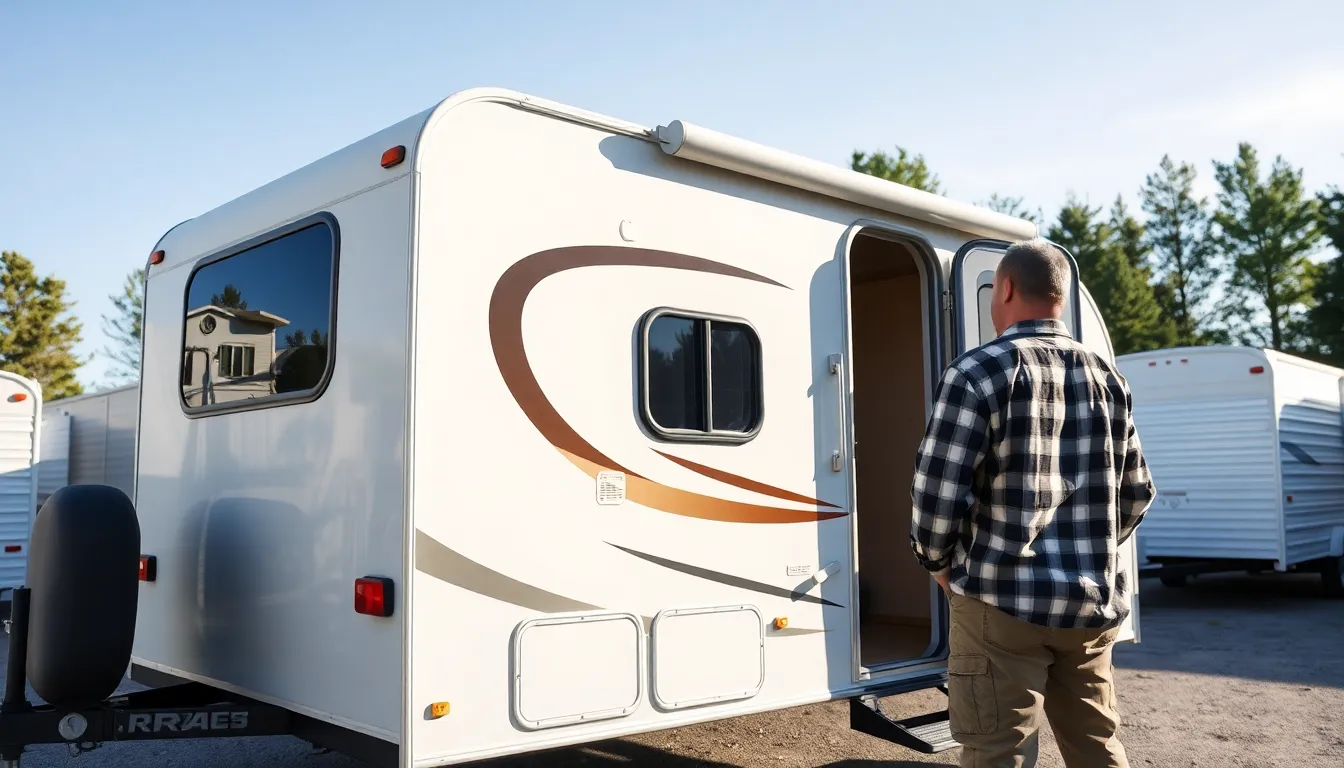Table of Contents
ToggleTravel trailers are the ultimate ticket to adventure, but what happens when the fun ends and it’s time to park that rolling home? Finding the right storage solution can feel like searching for a needle in a haystack—if the haystack were also a giant parking lot filled with other trailers. Fear not! With a little know-how, keeping that trailer safe and sound doesn’t have to be a headache.
Whether it’s winterizing your beloved rig or finding the perfect spot that won’t break the bank, mastering travel trailer storage can help ensure your adventures continue for years to come. From creative storage hacks to essential maintenance tips, this guide will turn you into a storage pro faster than you can say “road trip.” So buckle up and let’s dive into the world of travel trailer storage, where peace of mind meets practicality.
Understanding Travel Trailer Storage
Effective storage is vital for the upkeep and longevity of travel trailers. Various types of storage options are available, and each comes with unique benefits.
Types of Travel Trailer Storage
Indoor storage provides protection from the elements and offers climate control. Outdoor storage is often more affordable and convenient; however, trailers are exposed to weather conditions. Covered storage serves as a middle ground, shielding trailers from direct sun and rain without full enclosure. Self-storage facilities cater to travel trailer owners, featuring fenced areas and added security. On private property, dedicated space can minimize costs, but access and security vary. Each method presents different pros and cons to fit individual needs.
Benefits of Proper Storage
Proper storage ensures that the travel trailer remains in optimal condition. Long-term storage prevents issues like mold and mildew from moisture accumulation. Regular maintenance, performed during storage, keeps vital systems functioning efficiently. Well-maintained trailers maintain their value, which is crucial if resale becomes necessary. Safety also improves since enclosed storage reduces the risk of theft or vandalism. Each of these benefits contributes to an overall better ownership experience.
Preparing Your Travel Trailer for Storage

Properly preparing a travel trailer for storage ensures its longevity and condition. Attention to cleaning and maintenance, along with winterization, prevents issues during the off-season.
Cleaning and Maintenance Tips
Start by cleaning the exterior. Use a gentle cleanser to remove dirt and debris, protecting the paint and finish. Check for any signs of damage. Inspect seals and caulking for cracks. Addressing any imperfection prevents leaks and future repairs. Next, clean the interior thoroughly. Wipe surfaces and vacuum floors to reduce odors. Leave cabinets and appliances open slightly for air circulation. Ensure that all systems function correctly, including electrical and plumbing components. Test battery levels and tire pressure. Ensuring tire pressure is optimal prevents flat spots during storage.
Winterization Steps
Winterization begins with draining all water from the system. Open all faucets and drain valves to remove residual moisture. Add antifreeze to the plumbing system, focusing on pipes and tanks. This helps prevent freezing and bursting. Insulating the trailer protects against cold temperatures. Cover exterior pipes with foam insulation. Check the roof and seals for damage, repairing any leaks. Store the trailer in a dry location. Using a breathable cover prevents moisture buildup. Ensuring these steps enhances protection against winter conditions.
Choosing the Right Storage Location
Selecting an appropriate storage location is essential for maintaining a travel trailer’s condition and longevity. Both indoor and outdoor options offer unique benefits and challenges that influence the overall ownership experience.
Indoor vs. Outdoor Storage Options
Indoor storage presents superior protection against weather elements, providing a controlled environment that minimizes risks of rust, mold, and other damage. Security often improves with indoor storage, as facilities tend to have more robust surveillance measures. Conversely, outdoor storage generally costs less, appealing to budget-conscious owners. Outdoor options may offer more space, accommodating larger trailers. Owners must weigh the cost against potential risks when deciding which option fits their needs best.
Factors to Consider When Selecting a Storage Facility
Location plays a crucial role in selecting a storage facility, as convenience can ease access. Accessibility is another key factor; facilities should allow for easy entry and exit. Security features are important as well; look for gated access, cameras, and on-site personnel. Inspecting the condition of the facility also matters; choose a place that is clean and well-maintained. Lastly, inquire about the specific services offered, such as climate control or maintenance plans, to ensure the chosen facility aligns with storage goals.
Security Considerations for Travel Trailer Storage
Security is essential for safeguarding travel trailers during storage. Owners must take proactive steps to protect their investment and ensure peace of mind.
Measures to Protect Your Investment
Utilizing robust security measures strengthens the safety of stored travel trailers. High-quality locks serve as a first line of defense against theft. Surveillance cameras can monitor storage locations, deterring potential intruders. Fencing around outdoor storage areas adds an extra layer of protection. Owners may also consider using GPS tracking devices to track the trailer’s location in case of theft. Implementing these strategies not only protects the trailer but also enhances the owner’s confidence about their investment.
Insurance for Stored Travel Trailers
Acquiring insurance coverage specifically for stored travel trailers provides essential safeguards against potential losses. Comprehensive insurance policies cover theft, damage, and various unforeseen events that may occur during the storage period. Checking policy details is crucial for understanding coverage limits and exclusions. Owners also might explore specialized insurance options that focus on trailers, ensuring adequate protection. Regularly reviewing and updating insurance ensures it aligns with changing needs and value. Having adequate insurance mitigates financial risks associated with property loss or damage.
Proper travel trailer storage is essential for preserving its value and ensuring it remains ready for future adventures. By implementing the right maintenance practices and choosing an appropriate storage solution, owners can avoid common pitfalls like mold damage and theft.
Investing time in winterization and regular upkeep pays off in the long run. Whether opting for indoor or outdoor storage, understanding the benefits and risks associated with each option helps make informed decisions.
Ultimately, a well-stored travel trailer not only enhances the ownership experience but also provides peace of mind, allowing for worry-free journeys ahead.






